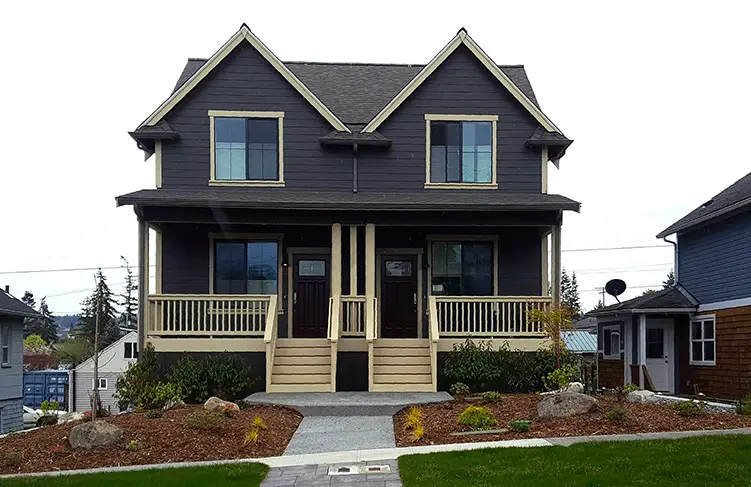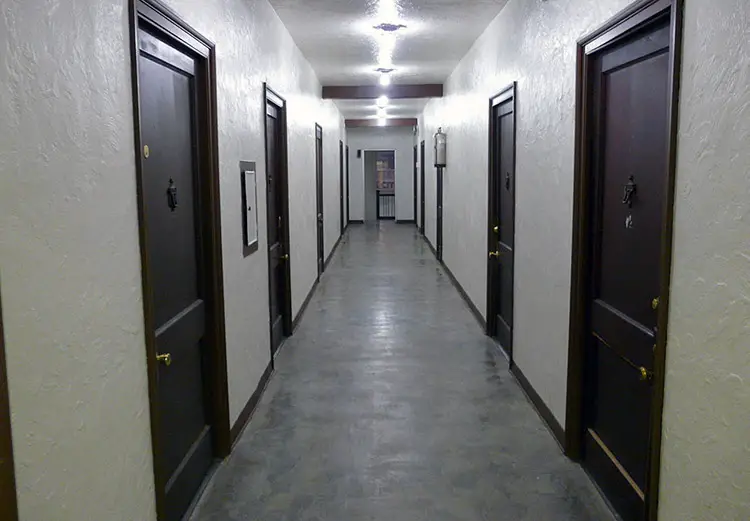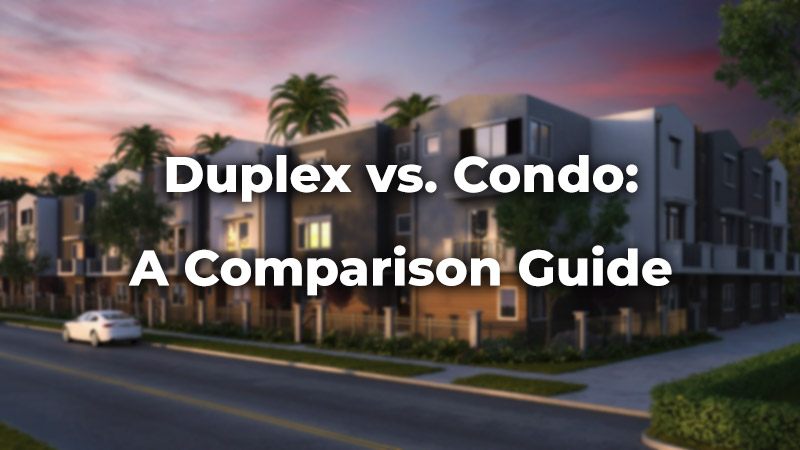There are many situations when you need to know exactly how a duplex and a condo differ from each other, and what are the benefits and drawbacks of each type of dwelling.
When you’re comparing a duplex and a condo, the major differences may seem obvious to most people, however, many of them still won’t be aware of some highly important details.
The main differences between a duplex and a condo lie in the structure and ownership. While a duplex is a single building with two separate living units that share a common wall (two-family home), a condo is a separately owned individual unit within a larger property complex.
Whether you are about to buy a new home, interested in real estate, or just collecting information, you’ll find some useful facts and tips in this article for sure.
What Is a Duplex?
Although many types of duplex house plans exist, the vast majority of them have several key characteristics in common.
While the meaning of the term ‘duplex’ is slightly different depending on the geographical location (for instance, in highly populated areas a duplex often refers to a maisonette), some basic knowledge will help you confidently distinguish a condo from a duplex.
Structure
Simply put, a duplex house has two living units in a single building. Therefore the units have a common wall and they usually have the same (or similar) floor area.
The units can be arranged in two different ways: side-by-side (this is more common) or one above the other (vertically). Either way, they almost always have two separate entrances.
Here’s an example of a duplex with a side-to-side arrangement:

A duplex is considered a type of multi-family property because, due to its structure, it allows two families to live side-by-side but still separately.
In most cases, there’s no direct connection between the units, so residents can live next to each other while maintaining privacy.
In some duplexes the entryway and the front door are common but the dwelling units still have their own entrances.
A building with more than two units connected to each other is commonly referred to as a multiplex. More precisely, a triplex contains three units while a fourplex has four individual units (with their own entrances).
In contrast, a townhouse is made up of several dwelling units, each having a common wall with the next one (a townhouse looks like a row of houses or duplexes).
Overall, a duplex looks very similar to a single-family home with the difference that the units share a common wall.
To be honest, I’m a big fan of duplexes (especially if my neighbor is one of my friends) because they offer many of the advantages of a detached house but at a lower cost. Also, they’re usually more centrally located in the town. As you’ll see, living in a condo is completely different in many ways.
Ownership
In most cases, a duplex house is on one lot and owned by a single individual. Sometimes the owner lives in one unit while the other unit is rented out. Often two tenants (but no owner) live inside the units. It’s not unusual that the only residents are relatives.
Since the whole property has a single owner, the units in a duplex usually share common areas, such as the backyard and driveway. Thus, in most cases, if you live in a duplex, you won’t have your own yard but a shared one with your neighbor.
If you own or rent a duplex, you may have to pay HOA (homeowners association) fees. This is something that should be clarified before buying or renting, therefore I suggest you read carefully the declaration of covenants, conditions, and restrictions.
The obvious advantage of being part of an HOA is that it sets up clear rules for all the residents and it takes the burden of maintaining common areas off your shoulders.
Twin home or duplex?
Don’t confuse a duplex with a twin home: while they’re very similar in structure, there’s a big difference in the ownership of the lot. While a duplex house shares a common lot, a twin house is on two separate lots. Therefore, in a twin home, you’ll have your own backyard, just like in a single family home.
What Is a Condo? How Is It Different From a Duplex?
Living in a condo is quite common, especially in cities. A condo is pretty much the same as an apartment but while an apartment is rented, a condo is owned.
Structure
Condos share many common features with duplexes, however, there are some fundamental differences as well.
In short, a condo (aka condominium) is a privately owned single unit in a larger building with several other similar individual units.
If you live in a condo, you’ll share common walls (usually more than one) with your neighbors. Therefore, if your condo is in a larger community complex, chances are good that there will be someone living above, below, and next to you as well (although detached condos also exist).
To enter your condo, you almost always need to cross common areas. So, unlike a duplex that often has a separate entrance that you can approach from the outside (street), the entrance of a condominium is often located inside the property complex and opens to a hallway.
Here’s a photo to have a closer idea of what I’m talking about:

Ownership
A condominium is owned and not rented. While everything inside the condo is yours, shared areas, such as elevators, hallways, pools, gyms, and garages, are jointly owned by all owners.
In contrast, a duplex can either be owned or rented. If you own a duplex, the whole building and everything on the lot is yours. On the other hand, if you rent a unit in a duplex, you still have to share common spaces but with far fewer people.
In most cases, HOA takes care of commonly shared areas for a monthly fee that can vary significantly based on services, amenities, location, and type of condo.
Also, if you live in a condo, you have to follow HOA rules that might not match your lifestyle. Therefore, I suggest you make sure you are aware of all the covenants and restrictions before buying a condo.
Tip: If you’ve never lived in a condo, it’s often a good idea to rent a similar apartment to see if this type of property suits your lifestyle before buying one.
Duplex vs Condo
Main Differences Between a Condo and a Duplex
- Structure: While a duplex is very similar in appearance to two single-family homes attached to each other, a condo is a smaller unit inside a larger property complex.
- Ownership: A condo is owned, while a duplex can be either owned or rented.
- Number of neighbors: If you live in a condo, you’ll have several neighbors, while in a duplex you’ll have no more than a single family living next to you.
- Common space: While both dwellings share common areas, a duplex will give you much more privacy than a condo.
- Homeowners association: A condo, in most cases, is required to join an HOA (and pay a fee), while a duplex is often not part of any HOA.
- Amenities: Condos can offer amenities, such as rooftop recreation or spa facilities that are not available in duplexes.
- Security: Generally speaking, a condo is more secure than a duplex (but much depends on the community, type of property, and the neighborhood).
Advantages and Disadvantages of Duplexes and Condos (Comparison)
Pros of a duplex:
- Living in a duplex is pretty much the same as living in a house, except that you’ll have to share a wall and common spaces with your neighbor.
- Instead of several neighbors, you only have one. Thus, you don’t have to share common areas with a whole set of people.
- This type of real estate is usually more affordable than a single-family detached home, and it’s often more centrally located.
- Many duplexes come with a separate garage and backyard.
- If you’re a duplex owner, you can rent out both units to tenants and earn regular rental income.
Cons of a duplex:
- While it’s true that duplex owners have only one neighbor, if they’re unlucky, that single neighbor can make their life difficult (especially in the absence of clear rules).
- Maintenance is more tedious and costly than in the case of a condo. Sometimes you have to do major repair works that can be quite expensive, especially if you’re not part of an HOA.
- Often it’s more time-consuming to sell a duplex than a condo (much depends on the neighborhood).
And now let’s move on to condos.
Benefits of condos:
- If you like living within a larger community and social life is important for you, a condo may be a better choice than a duplex.
- It’s usually cheaper than a duplex.
- HOA handles the maintenance of shared areas (often including roof repairs that would be pretty costly in a duplex), so you don’t have to take care of pretty much anything outside the unit.
- Most condos are located in the city center where many kinds of social and cultural opportunities are available.
- Living in a condo is generally pretty secure as the main entrance of the property is located inside a larger building, and the permanent presence of staff, such as concierges (where it’s available) further improves security.
- A condo can offer all kinds of amenities, such as steam rooms, hot tubs, gym areas, pools, and bars, just to mention a few. These are not available in a duplex.
- Often, a condo owner can rent out the unit to a tenant if they decide to live somewhere else. Sometimes a condo can be a profitable rental property.
- Condo insurance rates are typically lower (compared to duplex).
Drawbacks of condos:
- Living in a condominium means less privacy. You are surrounded by several neighbors and often you can’t even get into your property without having to cross common spaces.
- Everything outside the condo is considered a common area that you have to share with all the residents.
- Most condos do not come with a large green space.
- HOA rules and fees apply to almost all condos.
Should You Buy/Rent a Duplex or a Condo? Which One Is Best For You?
As you can see, a condo and a duplex differ in many aspects. Which one is best for you depends on many things, including your needs and preferences.
Here are some questions that will help you choose between the two types of dwellings:
- How long do you plan to stay at the same place? Do you know where you want to settle? If you’re moving a lot, a condo (or even an apartment) is often the better choice.
- If you’re single, do you plan to have a family in the near future? A duplex (or a stand-alone house) might be more comfortable for a family than a condo.
- Do you need a backyard and some green space? Or would you rather skip the gardening? In the former case, you’re better off renting or buying a duplex with a relatively large yard.
- Are you bothered by having multiple next-door neighbors? Or do you prefer community life and shared spaces? In the latter case, consider the condo.
- Do you travel a lot? In most cases, if you live in a duplex, you’re responsible for the exterior maintenance works, such as lawn mowing or snow removal. While you can always hire a property manager (or someone else) to do these jobs, if you live in a condo, it’s all handled by an HOA.
- What kinds of amenities are important for you? Condos offer all kinds of amenities, while it’s not typical of duplexes.
- How much time and money do you want to spend on maintenance? A condo usually requires less maintenance allowing you to save both time and money.
- What’s your budget? Last but not least, much depends on how much you are willing to pay for your new home. In general, living in a condo is cheaper but the final price is influenced by many things.
Whether you choose a condo or a duplex, it’s important that you make an informed decision. If you have questions, do not hesitate to ask for professional and unbiased advice. In most cases, it can be helpful to consult with a reliable real estate agent as well.
Photo credit: Flickr (Sightline Institute), Wikimedia (Piotrus)











